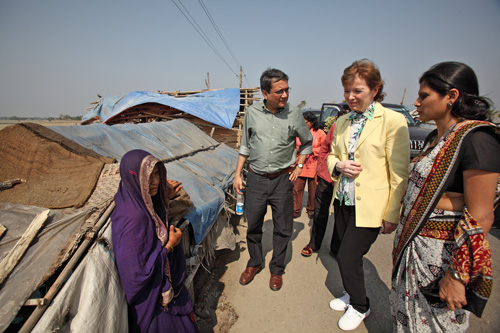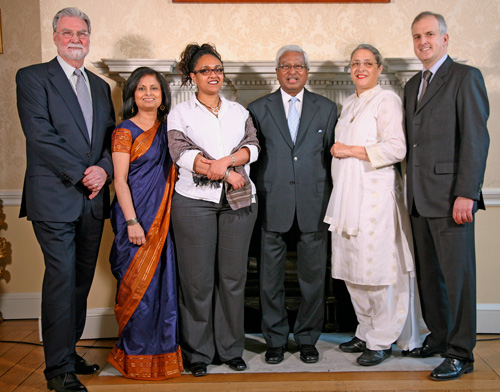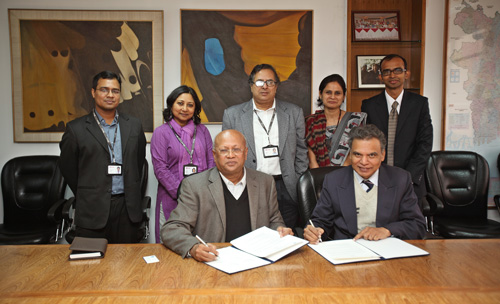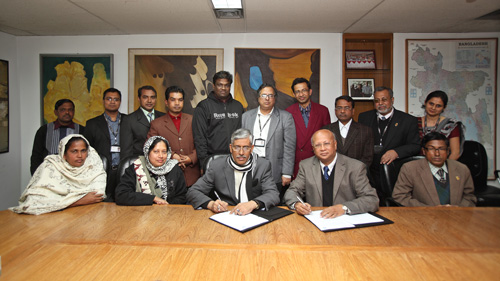
English (965)
Children categories
BRAC to work with UNDP to improve Gender Parity
02 March 2011, Dhaka. BRAC Community Empowerment and Strengthening Local Institutions Programme (CESLI) has been awarded a contract from United Nations Development Programme (UNDP) to implement a project titled “Joint Programme on Gender Based Violence”. The project aims to improve the overall gender based violence situation, particularly violence against women, through a comprehensive set of activities involving awareness raising and capacity building, developing networks and partnerships, policy advocacy, survivor support and establishing a database on violence against women. This is a 2 year project to be implemented in 6 districts of Bangladesh (Feni, Habiganj, Narshingdi, Sirajganj, Satkhira, Barguna) covering 41 upazilas and 388 union parishads.
Key activities of the project include -
- Capacity strengthening and sensitization of 5,000 officials and members from local administration, union parishads and upazilla levels to support, advise and guide the poor and vulnerable women against violence
- Capacity strengthening and sensitization of nearly 25,000 rural poor women and nearly 5,000 members of different forums created by UNDP and the government of Bangladesh to speak out against all kinds of violence and violation of human rights
- Activating and capacitating the District Legal Aid Committee (DLAC) and relevant standing committees of union parishad
- Establishing a credible, district level database on violence against women and build capacity of the local administration to maintain this database
- Advocacy and advisory support on violence against women issues at local, regional and national Levels
- Social and economic rehabilitation and reintegration of violence survivors
- Supporting in establishing network with existing union parishad standing committee, Women Development Forum, local human rights organisations, Bangladesh Union Parishad Forum’s district and central committees in creating stronger local platforms against gender based violence.
The “Joint Programme on Gender Based Violence" will be implemented within the ambit of two existing UNDP projects, BRAC and Bangladesh government’s Ministry of Local Government, Rural Development and Cooperatives (MLGRD&C). Besides these strategic partners, the intervention will embrace other human rights support organisations operational in the project area.
Pakistan Flood Victims Still Desperately Need Help
24 February 2011, Khyber-Pakhtunkhwa. The following article by Roshaneh Zafar, the founder of the Kashf Foundation, and Susan Davis, the president and CEO of BRAC USA, was published on the Forbes Corporate Social Responsibility Blog by Frederick E. Allen.
Imagine if Hurricane Katrina struck all the states from Florida to Massachusetts and massive floods washed away homes and businesses, destroyed roads and bridges, and devastated the lives of tens of millions of Americans. How quickly would we respond to the urgent need to provide short term relief and long term rehabilitation to the victims? We know the answer. There would be wall-to-wall daily media coverage with stories of devastation and emergency response, and a clarion call to Americans with direction on the most effective way to help those in need.
Last summer, the equivalent disaster happened in Pakistan. The magnitude of the flooding was so large that it left 20 million people displaced and 6 million shelterless. About 1.2 million hectares of standing crop worth $3.3 billion were destroyed. With the flood waters now mostly gone, the victims have returned to debilitated and uninhabitable homes with their belongings swept away.
In the face of such a dire assessment, the clarion call is being answered by the women and men of many organizations—government entities, nongovernmental organizations (NGOs), Pakistani celebrities, private companies, Pakistani media, and last but not least, private individuals. A number of Clinton Global Initiative (CGI) members (including Kashf and BRAC) are in this mix, and a CGI Pakistan Action Network was formed last September to coordinate the work of many members working in this critical area.
But it is the resilience of the individuals in Pakistan’s flood-affected communities that gives us cause for optimism. Small entrepreneurs are working to restore their enterprises with funding support from microfinance institutions. Communities are working to rebuild their schools and homes. With seed aid and other forms of assistance, farmers have planted seeds for the Rabi season.
The story of Rehman, who lived in a two-room home in Mannah village in the Kot Addu Tehsil in South Punjab, is illustrative of the stories of thousands of others affected by the flooding. Crippled by birth, Rehman has relied on his family’s help to get by. When the villagers received a warning that they must evacuate their homes, Rehman’s brother carried him on his shoulders to a camp set up by the army in the highlands. Thanks to his brother, Rehman survived the flood’s initial onslaught. He has returned to the location where his home used to be, only to learn that he has become homeless and all the assets of his family have been washed away. Rehman’s fate hangs in the balance. Presently, Rehman not only needs a consistent supply of food but with the winters setting in he also needs a permanent roof over his head.
In the Nowshera district of Khyber-Pakhtunkhwa, another area that was hard hit by the floods, Ulfat is patiently rebuilding her life. Several years ago, after being abandoned by her husband, she returned to her childhood home and began earning a livelihood by starting her own tailoring shop with a microloan. She dreamt of taking over her father’s buffalo-rearing and milk business. The floods, however, damaged their home and washed away their livelihood—two buffaloes, one calf, her sewing machine, and furniture. But Ulfat is not standing still. With a new microloan and her existing savings, she began her livelihood recovery by investing in one buffalo. It is producing 10 liters of milk a day for sale in the market, and it also gave birth to a calf. NGO workers came and fixed the water and sanitation facilities. Her life, however, is still far from what it used to be before the floods. Her family is still living in a tent, and she is still waiting for the opportunity to bring life back to her sewing business.
As seen in Rehman and Ulfat, the will to rebuild livelihoods homes is widespread. However the resources needed by Rehman, Ulfat, and the millions like them are still very scarce. Approximately 2,000 people have died from the floods, but in the flood-affected communities the death toll could rise if the related destabilizing threats are not tackled—water-borne diseases, food insecurity, destroyed economic opportunities, children who lost their schools, and homelessness at the onset of winter. The U.N. Secretary General has called this situation a “slow-moving Titanic.”
The response to Pakistan’s flooding has been slower than to other natural disasters. Within 10 days of the 2005 Pakistan earthquake, international aid commitment per person was $70; after the 2010 floods this value was much lower, at $4 per person. Of the $2 billion that the United Nations called for, only half has been funded.
In this time of tremendous need, people like Rehman and Ulfat need greater compassion from the international community. The private and non-governmental sectors in Pakistan have embarked on reconstruction and rehabilitation work. They need to be empowered to deliver much more than they are capable of doing now. People like Rehman and Ulfat are real people, not statistics. They are just like most of us—working hard, wanting a better life.
Reconstructing homes and schools. Restoring clean water supplies. Restarting economic activity with financial services, agricultural support, and more. This is what Kashf, BRAC, and other Pakistani organizations and individuals are doing. But the sheer enormity of the devastation suffered by 20 million people requires more people and resources to help the flood victims of Pakistan to rebuild their lives.
A panel discussion was held at Moulvibazar on ‘Radio Pollikontho’ by BRAC
14 February 2011, Dhaka. ‘A panel discussion was held at the Distirct Commissioners Office in Chadnighat union, Moulvibazar on the occasion of launching of a community radio station, ‘Radio Pollikontho’ by BRAC.
Present as chief guest was Mr. Mostafizur Rahman, District Commissioner, Moulvibazar and the discussion was chaired by Anna Minj, Director, Community Empowerment and Strengthening Local Institutions, BRAC.
Government officials, Private sector officials and the elites of the society took part in the panel discussion. Mr. A.H.M Bazlur Rahman, Chief Executive Officer, Bangladesh NGO’s network for Radio and Communications took part in the discussion. Among others, Syed Moshahid Ahmed, Deputy Director, Basic Bank Ltd., Moulvibazar Choumohona Branch, Bokshi Iqbal Ahmed, Editor, Daily Banglar Din, Polli Shomaj Chiefs Uma Das and Monju Rani were present.
‘Radio Pollikontho’ will work as a reliable and accessible medium to enhance the economic situation and ensure the rights of the local people of Moulvibazar. It will highlight the voice of women right from the grassroots level to other parts of society. It will highlight the local culture and heritage and increase participation of local population in rural development.
Radio Pollikontho will pass on the message of development and realizing potential through education, entertainment and information. People will benefit from an awareness of human rights and different ways to improve livelihoods, as well as the local culture and heritage which will be upheld by Radio Pollikontho.
The shows aired on ‘Radio Pollikontho’ will be based mostly on the local dialect and will be based on improving situation of the poor people, especially women and children.
‘Radio Pollikontho’ will be aired through Moulvibazar Radio station and will reach across a radius of 17 kilometres. It will be aired across 21 unions and will reach 400,000 rural people.
Even though the idea of a community radio station is widely known and used across the part, it is a very new idea in Bangladesh. The people present hope and believes BRAC’s Community Empowerment and Strengthening Local Institutions programme will make the community radio a success and achieve the goal of awareness among the people of Bangladesh and play an important role in building a Digital Bangladesh.
BRAC Bangladesh Partner Profiled in Forbes Magazine
01 February 2011, Dhaka. This month, Forbes profiled BRAC partner, VisionSpring, in an article titled, "New vision for non-profits." In it, VisionSpring Founder & CEO Jordan Kassalow discusses how the organization’s model has evolved and how he intends to make the organization increasingly self-sustaining. VisionSpring is a social enterprise dedicated to reducing poverty and generating opportunity in the developing world through the sale of affordable eyeglasses.
To become a self-sustaining organization that is independent of philanthropic dollars, VisionSpring partnered with BRAC in 2005 to begin scaling the sale of their eyeglasses through BRAC’s network of entrepreneurs in Bangladesh. In 2009, VisionSpring and BRAC signed a Memorandum of Understanding to formally launch the scaling throughout BRAC’s network of Shastha Shebikas, or Community Health Workers.
Helen Coster of Forbes writes, “Kassalow figured BRAC's 80,000-strong sales force could help him scale up faster while saving money on training and administrative costs.” Since the beginning of this partnership, BRAC’s entrepreneurs have sold nearly 100,000 eyeglasses and have reduced the cost of the program to VisionSpring.
While this partnership cannot make VisionSpring’s model entirely self-sustaining on its own, the BRAC entrepreneurs have dramatically propelled the VisionSpring mission: getting affordable eyeglasses to those who need them to live fulfilling, productive lives.
To learn more about BRAC’s partnership with VisionSpring, click here to read the full article.
"Climate Justice must be argued from human rights perspective", Mary Robinson at a BRAC round table on climate change

9 February 2011, Dhaka. "Bangladeshis should not portray themselves as victims, but rather should demand compensation for adaptation to climate change as their right", said Mary Robinson, visiting former President of Ireland at a round table meeting hosted by BRAC and BRAC University on Climate Justice. The meeting was chaired by Dr. Mahabub Hossain, Executive Director of BRAC, with the State Minister for Environment, Dr. Hasan Mahmud as the chief guest. Dr. Asaduzzman, Director of the Bangladesh Institute of Development Studies (BIDS) and Dr. Ainun Nishat, Vice-Chancellor of BRAC University, also spoke on the occasion. Dr. Babar Kabir, head of BRAC's Disaster, Environment and Climate Change programme, moderated the session.
The former head of the United Nations Human Rights Commission, Ms. Robinson said that her foundation will provide all kinds of help and will work with Bangladesh in making its case to the rest of the world with the urgency it deserves. 'There are real people who are affected and who are affected now', said Ms. Robinson who visited Koira yesterday with BRAC staff to see firsthand the destruction caused by cyclones attributed to climate change. Dr. Ainun Nishat, a climate expert himself, said that 50 percent of the people affected in Koira have already migrated to different parts of the country for economic need and this kind of migration will spread with increasing danger of climate change. He quoted a report of the Intergovernmental Panel on Climate Change (IPCC) that even if all emissions are stopped today, it will take another 30 to 40 years to stabilise the climate.
"The danger is real and it is imminent", echoed chief guest Dr. Hasan Mahmud. But he expressed his outrage that 1400 crore taka that was committed by the international community under the FAST Start funding for Bangladesh has not reached even after 14 months. He stressed the need for prioritising funds for adaptation and expressed confidence in Bangladesh negotiation team comprised of the country’s top experts. "Understanding the importance of this national issue, we did not change the negotiation team even after the government changed and that is why Bangladesh is leading the negotiation on behalf of the LDCs", said Dr. Mahmud.
Dr. Mahabub Hossain, underscored the need for addressing food security and highlighted BRAC's project in the Koira area where in the newly emerged land, although saline, maize is being cultivated with BRAC's technical assistance. He stressed the need for such knowledge transfer, education and innovation in dealing with the worst effects of climate change facing the country.
"It is this resiliency of the people that should be highlighted", said Ms. Robinson who admired the people of the coastal region in Bangladesh and how they were coping by being innovative. She said she will continue to advocate the issue of climate change from a human rights perspective because it highlights the issue of economic and social rights of the people which is often undermined. She said she has been struck by how little understanding there is in the richer world on how damaging climate change has been for real people in countries like Bangladesh. She said her foundation will work with BRAC in portraying a people-centric approach towards climate change. She also expressed her eagerness in working on a project to harness the leadership of women in fighting climate change.
The meeting was attended by experts and civil society members who expressed the need for urgency in tackling climate finance and adaptation.
Recognising the achievements of BRAC employees
The first ever BRAC Brand Awards took place on Wednesday 2 February 2011 at BRAC's head office. The event marked the one year anniversary of the new BRAC brand and also the 39th birthday of BRAC.
The new BRAC brand was launched in February 2010 in an effort to rejuvenate and reaffirm our identity and to communicate our evolution as a changing international development organisation.
The awards recognised and honoured BRAC employees 'living the brand' through their work in the organisation. Awards were given out in three categories; 'Most Brand Compliant Programme/Department', 'Brand Ambassador' and 'Living the Values' which awarded employees for their Innovation, Integrity, Inclusiveness, Effectiveness.
BRAC Chairperson, Sir Fazle, and the Executive Director, Dr Mahabub Hossain, handed out the awards and prizes to the winners. Winners came from various departments and programmes across the organisation in Bangladesh and around the world.
Founding leaders of BRAC UK retire after five years of achievement
24 January 2011, London. The founding leaders of BRAC UK – Professor Patrick Vaughan, Chairperson, and Sandra Kabir, Executive Director – both announced that they would be moving on in early 2011.
Their decision marks five years of successful collaboration as a leadership team that firmly established BRAC UK – both in the UK and internationally.
The organisation was founded as an affiliate to BRAC – the award winning international organisation based in Bangladesh and the world’s largest NGO. With Patrick as Chair of the Trustees and Sandra as Executive Director, BRAC UK has grown from a fledgling NGO to a well respected organisation that tackles and addresses the causes and effects of poverty in places as diverse as Tower Hamlets in East London to Juba in Southern Sudan.

Patrick Vaughan (far left) and Sandra Kabir (2nd from the right) with Sir Fazle Hasan Abed, BRAC Founder and Chairperson, and BRAC UK Trustees – London, 2010.
Both Patrick and Sandra were particularly passionate about the role that BRAC UK played in advocating a ‘South-South’ approach to development, as well as in ‘South-North’ development dialogues. The support of the British-Bangladesh communities has been central to BRAC UK establishing its reputation and engaging decision makers in diaspora issues.
Staff, clients and friends paid tribute to both Sandra and Patrick for their inspirational leadership style and said they would be greatly missed. Mark Goldring, BRAC UK Trustee, said:
"Patrick and Sandra have put heart and soul into ensuring that BRAC's wonderful work tackling poverty and disadvantage has been extended into Britain, benefiting poorer Asian communities within London, and that the UK has been able to help BRAC extend its work from Bangladesh around other countries of the developing world. We owe them sincere thanks and appreciation."
Geoffrey Salkeld has been appointed interim Executive Director to assist the Board in searching for a new Executive Director to take BRAC UK forward into its next phase of growth and development.
Geoffrey is a retired, highly experienced, development professional who has held executive positions at the World Bank (Indonesia), UN (India), and NGOs including Oxfam GB, Oxfam Novib (Netherlands) and Oxfam International. He specialises in project and programme evaluations and facilitating strategic planning.
A new chairperson will be announced shortly.
Update on the earthquake in Pakistan
19 January 2011, Below is an e-mail we receive from the head of BRAC in Pakistan regarding yesterday's earthquake.
Dear Everyone,
Hope you are well and fine.
Perhaps you have heard that a strong earthquake with a magnitude 7.4 hits SW Pakistan at about 2:30 AM. It was in a desert area bordering Iran and Afghanistan.
The quake struck at a depth of just 10km (6.2 miles) at 2,023 GMT on Tuesday ,some 55 km (34 miles) west of Dalbandian in Pakistan. It was located several hundred kilometres from the Pakistani city of Quetta and the city of Zahedan, Iran.
Our regional manager in Quetta informed us that the earth quake lasted only for few seconds.There were no casualities or damage to houses or other assets. People were running out of their houses in fear of earthquake. Inshallah we are all safe and sound.
Best regards,
Farid
Muhammed Faridur Rahman
Chief Executive Officer & Country Representative
BRAC Pakistan
BRAC stepping into the era of innovation

16 January 2011, Dhaka. A Memorandum of Understanding (MoU) was signed between BRAC and the Regional Integrated Multi-Hazard Early Warning System for Africa and Asia (RIMES) on January 13 at BRAC Centre, Dhaka.
The MoU aims at reducing disaster risks in Bangladesh through application of early warning information at different timescale, specifically:
- Translation of early warning information into impact outlook and response options
- Enhancing communication of early warning information by addressing last mile gaps
- Improvement of community level responses to early warning information
This Mou will enable the integration of RIMES weather and climate information into BRAC’s Disaster Risk Reduction programme and the climate change information into BRAC’s Climate Change Adaptation programme. RIMES will also provide BRAC with provisions of training and capacity building in this regard.
Dr. Mahabub Hossain, BRAC Executive Director and Mr A.R. Subbiah, RIMES Director signed the MoU on behalf of the respective organisations.
During the signing ceremony, Mr. Subbiah stated, “BRAC is the first ever organisation we will be working with. We consider BRAC as a valuable partner. It will be fascinating to translate science into practical use as BRAC will implement the information we provide them on the field and help people who are directly affected by climate changes.”
The agreement will last up to a period of five years.
BRAC and Tongi municipality’s green agreement

16 January 2011, Dhaka. A Memorandum of Understanding (MoU) was signed between BRAC and the Tongi municipality on January 13 at BRAC Centre, Dhaka.
Dr. Mahabub Hossain, BRAC Executive Director and Advocate Md. Azmat Ullah Khan, Honourable Mayor of Tongi municipality signed the MoU on behalf of the respective parties.
Under the agreement, BRAC has offered to assist Tongi municipality in the collection of the waste, and to construct and operate a Municipal Solid Waste (MSW) treatment plant.
Presently Tongi municipality disposes the collected waste in an unhygienic manner mainly for shortage of sufficient dumping areas. Under this agreement, BRAC will jointly collect the entire amount of solid waste generated within the boundary of the Tongi municipality and will treat and process the total waste scientifically at its own facility located within Tongi.
During the signing ceremony, Mayor Azmat stated, “Whenever we talk about development issues in Bangladesh, BRAC and Sir Fazle’s name always come up in the discussion. Hence, we are thrilled to be working with BRAC. It is the first time ever that the Tongi municipality has signed an agreement with a non-government organisation. The motto of this project is to reduce, reuse and recycle. My entire staff along with the people of Tongi municipality welcomes and embraces this partnership.”
BRAC is undertaking this venture in order to create a healthy environment for the dwellers of Tongi municipality.
Join the world’s biggest family




